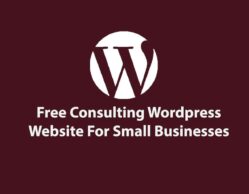In case you weren’t aware, WordPress.com and WordPress.org are two entirely separate platforms. WordPress.com and WordPress.org are two different blogging platforms, and many newbies get them mixed up. Some people who are aware that they exist as respective platforms nevertheless, may not understand what sets them apart.
WordPress.com vs. WordPress.org is a question we’re often asked. To answer that, we compared WordPress.com vs. WordPress.org.
This article aims to help you decide which version of WordPress is best for your needs by comparing WordPress.com with WordPress.org. Having stated that, let’s compare and contrast WordPress.com with WordPress.org.
WordPress.com vs WordPress.org Comparison
Examining each platform separately is the most effective method for gaining an understanding of the distinctions that exist between WordPress.com and WordPress.org.
WordPress.org
The content management system (CMS) is known as WordPress.org, also known as the popular website platform about which you have heard all of the beautiful things.
It is open-source software, and users are not required to pay anything to make use of it. You will only require a website domain name and web hosting to get started. Because of this, you may also hear it referred to as self-hosted WordPress.
The following is a list of the advantages and disadvantages of using the self-hosted version of WordPress.org to create your website.
- WordPress software does not cost anything, it is open-source, and it is very simple to operate. More than 43 per cent of all websites on the internet are powered by WordPress.
- You are the sole owner of your website as well as all of the data it contains. Your website will NOT be disabled because a third party determines that it violates the terms of service they provide
- On your WordPress site, you have the option of installing free and premium plugins.
- You have the ability to change the style of your website to suit your needs. You are able to utilise any WordPress theme, regardless of whether it is a free or paid theme. Users are also free to build designs that are entirely unique to your needs or alter any aspect of the product.
- By placing and managing your own advertisements, you can monetize your WordPress site and keep all of the proceeds.
- You are able to set up an online store with WordPress that is self-hosted, sell digital or physical things, receive payments through credit card, and distribute or ship the products straight from your website.
Using a self-hosted WordPress.org site has very few downsides. Below are the drawbacks.
- You will, of course, require web hosting for your website. The initial cost is somewhere between three and ten dollars per month. However, the expenses of your web hosting plan are going to climb as your website expands and receives a greater volume of visitors. At that point, however, you will be producing enough money to cover those expenses.
- Installing WordPress is going to be necessary. Fortunately, the vast majority of prominent WordPress hosting companies offer installation alternatives for WordPress that only require one click.
- You are responsible for updates. You can easily update your WordPress site by clicking on the update button which only requires one click, so it does not require a lot of effort on your part.
- You are in charge of making backups. There are a lot of backup plugins for WordPress that let you set up automatic backups
How much a WordPress.org site really costs depends on what you want to build There are also other things to think about, like free vs. paid templates, free vs. paid plugins, etc. You can build a website for as little as $46 per year if you are on a tight budget. For 99% of users, our recommendation is always to use WordPress.org.
The Bluehost team is giving our readers a 70% discount on web hosting and a free domain name. They are the official recommended WordPress hosting company by WordPress.org
WordPress.com
Automattic, led by WordPress co-founder Matt Mullenweg, established WordPress.com. Users commonly confuse WordPress.com and WordPress.org due to the same creator.
WordPress.com offers 6 plans named below:
- Free – Very limited.
- Personal – $48 per year
- Premium – $96 per year
- Business – $300 per year
- eCommerce – $540 per year
- VIP – starting at $5000 per month
For people who are only interested in blogging as a hobby or for their family, the free platform offered by WordPress.com is an excellent option. The following is a list of some of the advantages of using WordPress.com:
- It is free to use for up to 3 GB of storage space. After that, if you want extra space in your account, you will have to upgrade to a paid plan. With the Personal plan, you get 6 GB of storage for $48 per year; with the Premium plan, you get 13 GB for $96 per year; and with the Business plan, you get 200 GB of storage for $300 per year.
- You won’t have to stress about keeping your system up to date or backing it up. WordPress.com is going to handle all of that for you.
There are a number of limitations that apply to using the free version of WordPress.com, which is what sets it apart from WordPress.org. The following is a list of some of the drawbacks associated with using WordPress.com:
- They post advertisements on all of the free websites. Despite the fact that your customers see those advertisements, you do not profit from them in any way. You can upgrade to a paid plan on WordPress.com
- Because you are not permitted to sell advertisements on your website, your opportunities to generate revenue through ad revenue are severely restricted. If you have a website that receives a significant amount of traffic, then you are eligible to apply for their advertising programme called WordAds. Through this programme, you will share earnings with the company. Users of the Premium and Business plans can begin using WordAds immediately.
- You are unable to submit your own customised themes. Users on the free plan have access to a small selection of the available free themes to install. Users of the premium and business plans both have access to premium theme options. The free edition has a restricted number of options for personalization to choose from. Users of the Premium and Business plans have access to the custom CSS option.
- You are only allowed to use their statistics. You are unable to install any other tracking software that is as powerful as Google Analytics.
- Free websites hosted on WordPress.com come with a subdomain that is branded with the WordPress.com URL (for example, https://yourwebsite.wordpress.com). To obtain a personalised domain name, you will need to subscribe to a premium plan.
- If you do not upgrade to the eCommerce plan, WordPress.com will not provide you with any eCommerce features and will not have any integrated payment methods.
Whether you choose the free, personal, or even premium plan, the WordPress.com hosting platform has a lot of restrictions, as is evident above. If you want access to some of the more advanced features, you will need to subscribe to either the Business plan (which costs $300 per year) or the VIP plan (which costs $5,000 per month).
WordPress.com vs WordPress.org – Which is Better?
WordPress.com is a great option for personal bloggers who aren’t interested in monetizing their sites. We advise choosing the self-hosted WordPress.org version if you are a company or a blogger with commercial aspirations. In other words, it allows you a great deal of freedom in how you expand your site.
While the WordPress.com Business plan of $300 / year for each website offers access to a number of useful extras, a self-hosted WordPress site allows you to get far more for your money.
When comparing platforms, we find WordPress.org to be superior in every way. It’s the standard used by all serious bloggers, entrepreneurs, and even major corporations like Disney.
Can I move from WordPress.com to WordPress.org?
When first getting started with WordPress, many first-time users choose the free WordPress.com service because they are unsure of the differences between WordPress.com and WordPress.org. When users become aware of the constraints imposed by the platform, they express a desire to make the transition to Real WordPress, also known as WordPress.org.
Yes, moving all of your content from WordPress.com to WordPress.org is something that can absolutely be done, and it won’t take you very long at all.
WordPress.com vs WordPress.org our take
The comparison of renting a house versus owning a house serves as the model that is most helpful in understanding the distinctions between WordPress.com and WordPress.org.
The use of WordPress.com is comparable to leasing an apartment. Your power and control over the things you can and cannot do are severely restricted.
Using WordPress.org is comparable to having your own home. Where you have complete authority, you cannot be expelled by anyone, and you are free to act in whatever way you see fit.
In conclusion
WordPress.com vs WordPress.org with their similar domain names has created confusion for beginners who wants to be bloggers. We sincerely hope this post was informative in clarifying the distinctions between WordPress.org and WordPress.com.
We think WordPress.org is a great choice for your website and wish you the best of luck with it.





